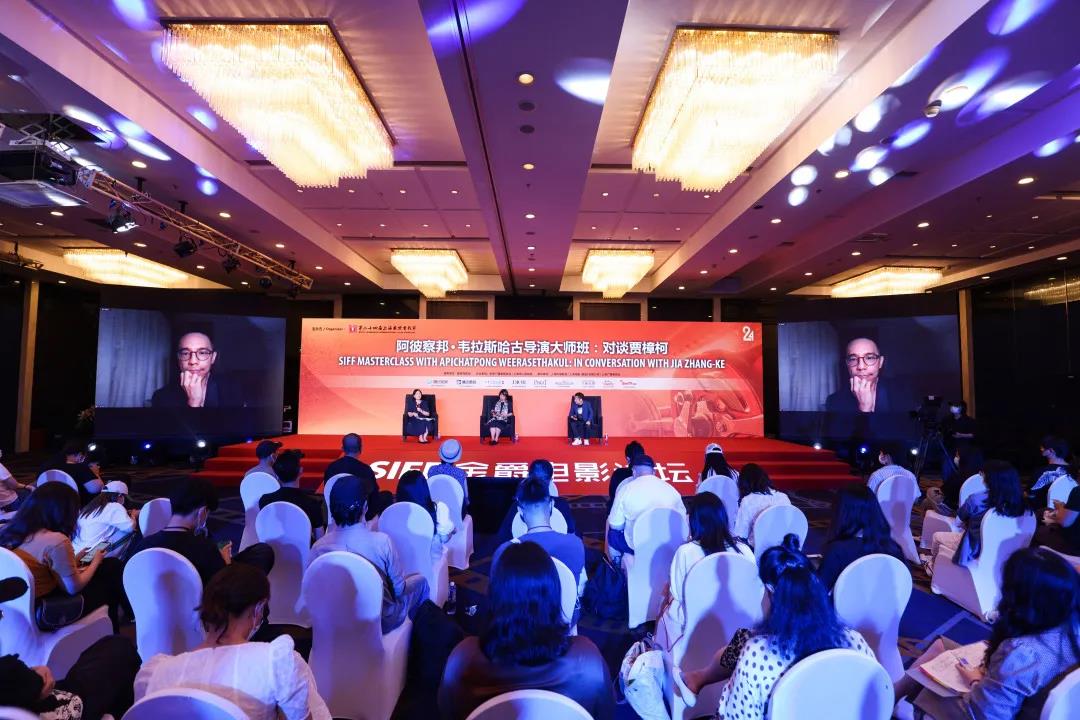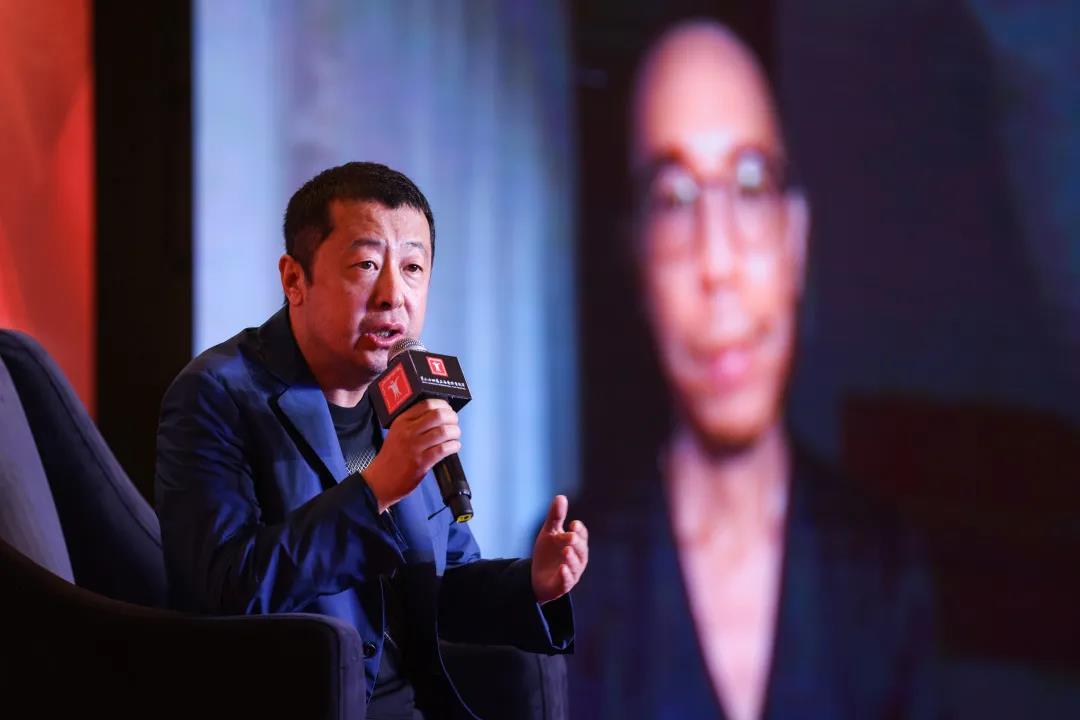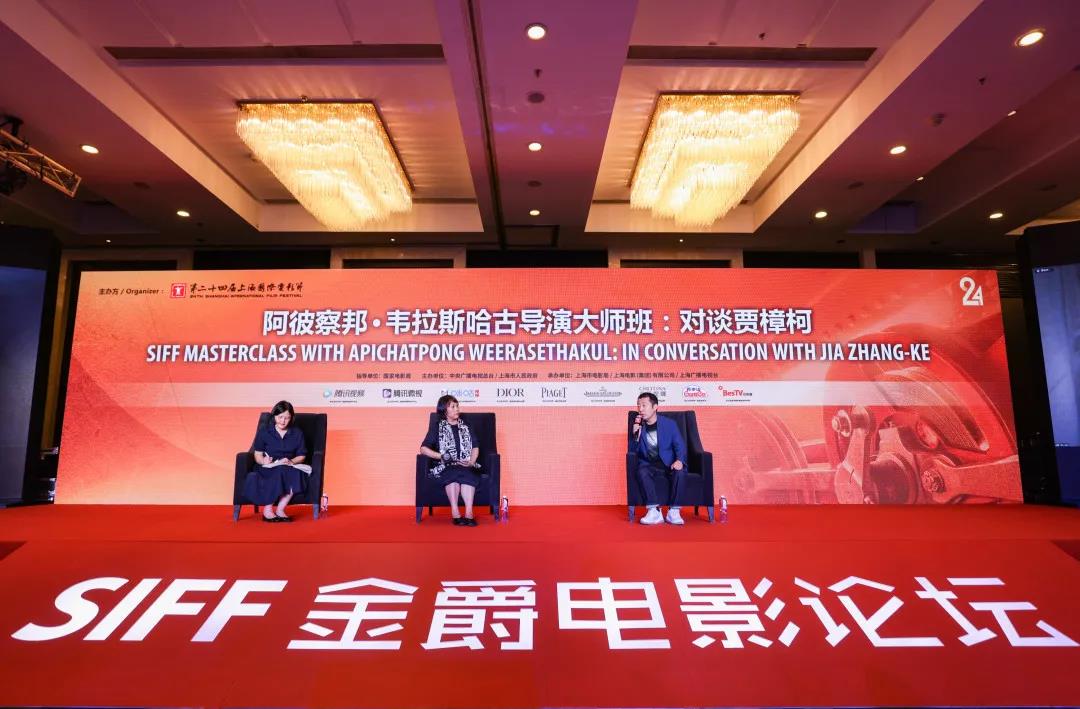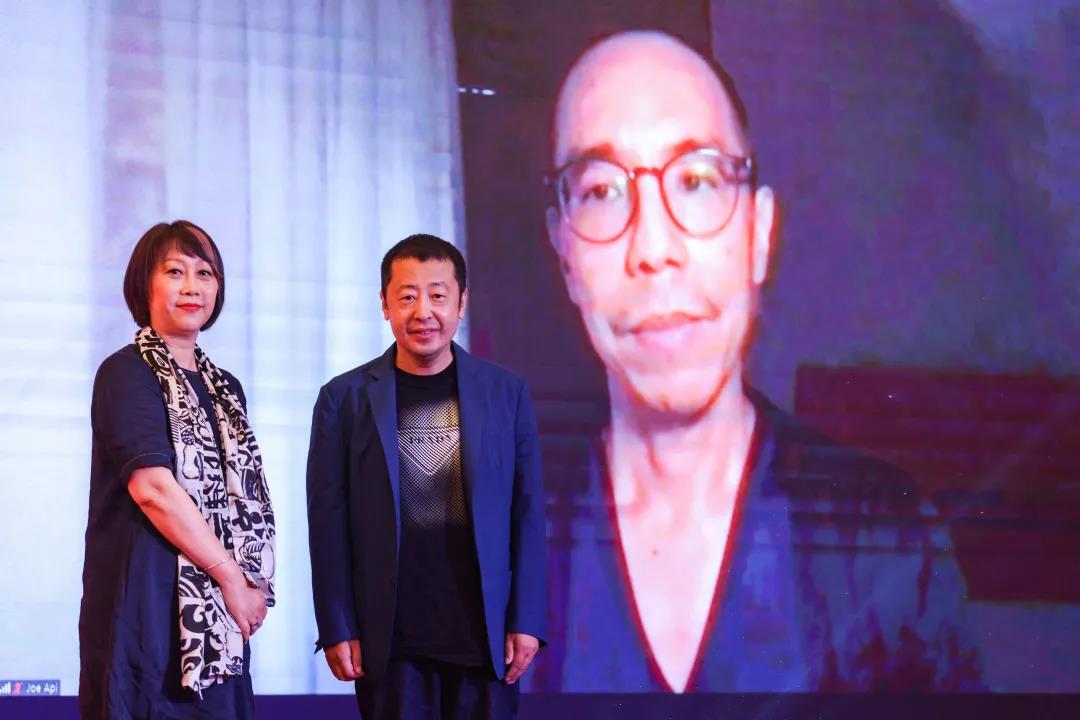MasterClass|Dialogue between Apichatpong and Jia Zhangke: Through the lens, the "love and hatred" towards the hometown is expressed
Last night (June 12), the 24th Shanghai International Film Festival (SIFF) MasterClass ushered in a live chat of two major directors: one is a famous director, screenwriter, and producer in Thailand, Apichatpong Weerasethakul, the other is the famous Chinese director Jia Zhangke who was on the scene of SIFF.
Apichatpong is known as a new generation of Asian film masters and an outstanding representative of "slow movies". He has won many international awards: the feature film debut "Mysterious Object at Noon" established his position in the film industry, and his masterpiece "Uncle Boonmee Who Can Recall His Past Lives" and "Tropical Malady" have won the Palme d’Or and the Jury Prize at the Cannes Film Festival respectively. His new film "Memoria" will also be screened at this year’s Cannes Film Festival, and director Jia Zhangke is also seen frequently at major international film festivals and have won many awards.
This online conversation is not the first "close encounter" between the two directors. During the epidemic last year, Jia Zhangke published an open letter to fans around the world in the Dutch film magazine "Filmkrant". Apichatpong immediately responded positively by publishing an article "The Movie Now" in the magazine, showing of the mutual understanding between the two directors. "Memoria" has just been shortlisted for the main competition unit of this year's Cannes Film Festival. The film is starring Tilda Swinton and Jia Zhangke is the co-producer.

The intertwined feeling of "love and hate " toward hometown
Both Apichatbang and Jia Zhangke were born in 1970. In an era of rapid socio-economic and cultural development in Thailand and China, the memories and reflections on the hometown have become the common source of creation for two directors of the same age.
Apichatpong claimed that there is a feeling of intertwined "love and hatred" between himself and his hometown. Love is because he is very obsessed with his memories of his hometown. "I had a free childhood there. It taught me a lot of knowledge and also gave me many opportunities to dream." Apichatpong called his hometown Khon Kaen the place where he "discovered movies". Because his parents are doctors, before "discovering the movie," Apichatpong entered a spiritual world far away from the small town and reality by looking through the pictures of cells and microorganisms in the medical textbooks at home. The movie theater in the small town also left a deep impression on his childhood.
But even this same hometown destroyed the dream of a passionate and ideal artist. Apichatpong said that it was not until he became an adult that he realized that there were various sufferings in this small town, and it was not as beautiful as he had imagined. "Of course, my hometown has always been a source of inspiration for me, and I also hope to see how the experience of the new generation of people who grew up there differs from me."

Jia Zhangke even introduced his hometown, Fenyang, Shanxi, to fans through films. Starting from the first film "The Pickpocket", most of Jia Zhangke's works were conceived around Fenyang and shot in Fenyang. "Because China has a large land area, each region does have its own personality characteristics. When dealing with the same thing or a relationship, in a certain emotional situation, the ways of speaking and thinking are different from each region. I am from Fenyang, Shanxi, and the emotional processing and expression that I know best must come from Fenyang. Therefore, I am willing to set the characters as being from Shanxi or Fenyang."
Jia Zhangke specifically mentioned that both he and Apichatpong had experienced an era of rapid change. After leaving their hometown and moving towards a larger world, they will re-examine their hometown and gain a broader and tolerant perspective. "When you were a child in a small closed city, you had a lot of imagination outside. But when you are an adult and have a lot of travel, you will find that in fact, many small and medium cities in China are the same and similar. My hometown has not only the uniqueness in emotion, but also the universality that can represent most parts of China in terms of living conditions and development status. "
Cross-discipline background becomes an advantage
Both Apichatpong and Jia Zhangke did not study directing at first: Although they loved movies since childhood and wanted to be a filmmaker, Apichatpong chose to major in architecture at Khon Kaen University because he was unwilling to leave his hometown; Jia Zhangke entered the Department of Literature of Beijing Film Academy after studying fine art for more than two years.
However, the cross-discipline background had also become the nourishment that will foster the two directors' careers in the future. Apichatpong explained that architecture and film have many things in common, the most obvious of which is the design of space. "Let the characters walk in one space, or from one space to another. You have to observe what emotions they express or what emotions are aroused in them when they move. Architecture is space, and architecture is also emotion." Directors and architects are the same, no one can work alone, and they all need a lot of helpers. The teamwork spirit that Apichatpong has experienced in architecture also applies to his work as a director.
Jia Zhangke recalled that more than two years of art studies have profoundly affected his directorship. The first is the change in observation methods, because drawing sketches starts with observation, observing the structure, shape, color, and environmental effects of light and shadow, etc. "When you see the world with light and shadow and highlights, that three-dimensional sense will greatly change the visual experience of Chinese people's flatness." Secondly, the study of art history also contributes to the formation of a person's way of thinking. Throughout the history of art, in addition to "art" itself, it also assumed many functions, such as religious painting, portrait painting, and daily painting. When the camera and the video camera appear in sequence, and the other expressions are taken over by the updated technology, the art presents its nature and essence. And this also applies to thinking about the essence of movies.

In addition to movies, the two directors also showed an interest in contemporary art. As early as 2017, Jia Zhangke founded the "Jia Zhangke Art Center" in Jiajiazhuang, Fenyang; last year, Jia Zhangke held his first solo art exhibition. Jia Zhangke said with a smile that his hobby of contemporary art is due to the extremely long expression cycle of movies, but there are always many ways to express in daily life. "I think it's a good supplement to shooting. A film will take two years from writing the script, finding actors, finding money, and finishing filming. But the reality is so rich and varied, you always have something impromptu to express. I think contemporary art is a good way of expression.” Jia Zhangke has accumulated a lot of photographic works before. In recent years, he has begun to experiment with installation art creation. His latest installation art work is being exhibited in Amsterdam.
In Thailand, Apichatpong is also an outstanding contemporary artist. Apichatbang said that compared with movies, making contemporary art works gives him more freedom. "For me, making movies is more of a personal expression; and if I want to create contemporary art, it is to meet my social needs. I hope that through my own contemporary art creation, it can be used as way to looking for the truth, and look from different perspectives, so that I will have a better and deeper understanding of my country."
Don’t equate identity with movies
Apichatbang had been invited to SIFF as early as 2007, and he was very familiar with Chinese films and filmmakers, and the filmmaker who most wanted to collaborate with was Jia Zhangke. Apichatbang received strong support from Jia Zhangke during the filming of "Cemetery of Splendor". In the latest movie "Memoria", the two directors are even more involved.
Regarding this cooperation, Apichatpong admitted that he was very nervous at the beginning and was afraid of "shame" in front of Jia Zhangke, but the entire cooperation process was very pleasant. "One of the most important points, because Director Jia fully remembers his identity as a producer. Like all good producers, he absolutely gives the director freedom, respects the director, and does not interfere with me, so we have a very happy shooting. "
The two directors not only generously supported their peers who are equally prestigious, but also spared no effort in supporting young filmmakers. In Thailand, Apichatpong founded the Bangkok Experimental Film Festival and established Kick the Machine to create opportunities for more young filmmakers. According to Apichatpong, what young filmmakers need to do most is to be able to enjoy life and enjoy the present; they must start by observing their own body and then extend to their relationship with the surrounding world. "Because the body itself is a kind of art, you can only explore it after you understand your body, and then express this exploration through a movie. In fact, it is very difficult to understand yourself."

When asked about his advice to young filmmakers, Apichatpong emphasized that it is recommended that everyone should not enshrine film in a humble way, and equate their personal identity with the film. In case of failure, the edifice of personal identity will collapse suddenly and make one feel like a loser. "A lot of young filmmakers watched a lot of movies, and then they started to be hesitant. I saw this movie and felt that I wanted this style. I saw that movie and felt that I was better off shooting that style. This is a very difficult choice, so I suggest you watch more, listen more, do meditation more, these will help."
In China, the 4th Pingyao Crouching Tiger Hidden Dragon International Film Festival which was initiated by Jia Zhangke was held in 2020. The film festival has multiple links to support young filmmakers, such as venture capital and new film screenings. "Although it is young, it has developed very quickly. You will see a completely different film imagination and a new film world."
In April this year, the Shanxi Film Academy, headed by Jia Zhangke, was established, and it has also become a destination for many young filmmakers. Jia Zhangke said that the college's teaching model is still under planning, but as a person who has studied in the film school for four years, he has many ideas that he hopes can be realized in real teaching. "For example, we will set up a documentary class in the basic course to let everyone understand what film is. For the photography major, we decided to resume film teaching. While students embrace digital technology, they must master traditional film technology at the same time."







